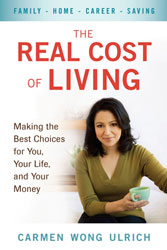
Exclusive excerpt from The REAL COST of LIVING (Perigee/Penguin) by Carmen Wong Ulrich.
Weighing the costs of staying at home vs. going back to work should be personal. Weigh your sanity and happiness against and alongside the financial repercussions of taking time to stay home. Calculate just what an unpaid twelve-week (federally mandated for most employers) leave will cost your bank accounts, and work to save up your vacation and personal days so it ends up being more like eight weeks unpaid leave. Also, look realistically at your health insurance situation, retirement benefits, your taxes, and any other work expenses such as commuting costs. It may make more sense for the father to opt out for a while instead. And as we advance in the workplace, more and more dads are making that choice.
Should you decide to stay home for longer to care for your family, realize that not all costs and benefits are financial. The time you spend raising children is a fantastic investment in both their future and yours. You may not see a price tag return on this investment now, but there is no doubt that it exists not only within your four walls but in the greater society as well.
Read Related: Being a Stay At Home Mom, Privilege or Right?
 The Emotional Benefits of Higher Education
The Emotional Benefits of Higher Education
Whether you’re considering a degree, or another degree, for yourself or you’re peering into what looks like a prohibitively expensive future education for your kids, it’s not just personal fulfillment that can reduce the cost of a degree, but the fact that that degree offers a return that’s not measurable as a salary. According to the Pew Research Center, college grads are just plain ol’ happier! In their most recent happiness survey, Pew found that 42% of college graduates report that they are “very happy” vs. only 30% of those with high school degrees. Now, correlation does not equal causation, and obviously there are many other reasons why these results are so. Let’s look at the personal return on that degree:
From How Large Are Returns to Schooling? HINT: Money Isn’t Everything (2009) by the National Bureau of Economic Research:
• Schooling leads to better decisions about health, marriage, and parenting.
• Schooling improves patience and makes people more goal oriented and less likely to engage in risky behavior.
• Schooling improves trust and social interaction and offers substantial consumption value.











